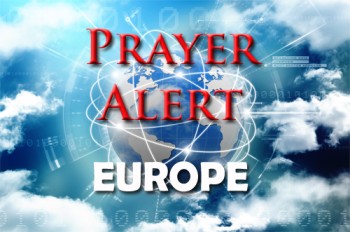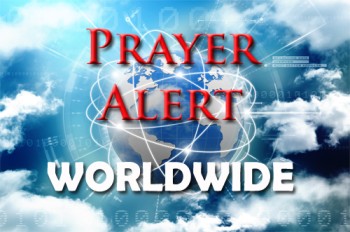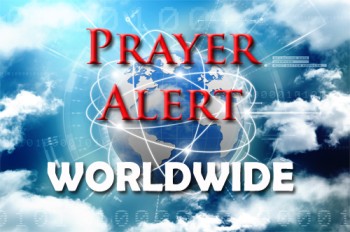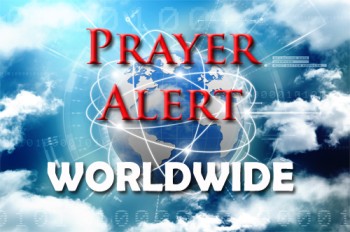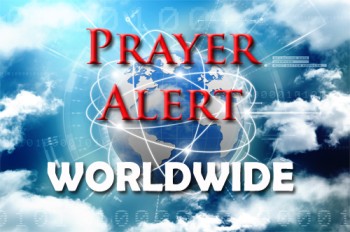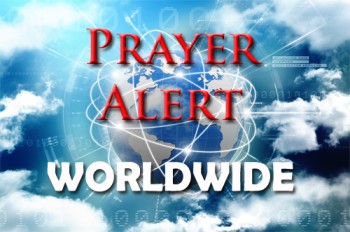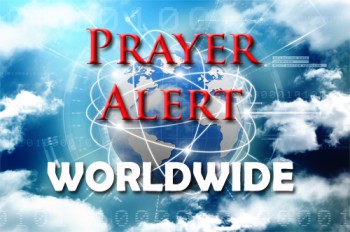
David Fletcher
David Fletcher is Prayer Alert’s Editor.
He is part of a voluntary team who research, proof-read and publish Prayer Alert each week.
If you would like to make a donation towards our running costs, please click here.
Donald Trump has granted Hungary a one-year exemption from US sanctions on Russian oil and gas purchases, marking a diplomatic win for Viktor Orbán. The move followed Orbán’s visit to Washington, where Trump expressed sympathy for Hungary’s dependence on Russian energy as a landlocked nation. The decision contrasts sharply with Trump’s recent threats to penalise countries doing business with sanctioned Russian energy firms. In return, Hungary agreed to buy hundreds of millions of dollars’ worth of US natural gas. While the arrangement may ease Hungary’s energy pressures, it risks deepening tensions within the EU, where many leaders oppose Orbán’s continued cooperation with Moscow. Trump praised Orbán’s leadership and hinted at shared goals for ending the war in Ukraine, underscoring their close personal and political alliance amid growing divisions over energy, sanctions, and peace strategy in Europe.
On 11 November hundreds of Indigenous activists stormed the UN COP30 climate summit in Belém, demanding real protection for their lands and rights amid growing frustration over government inaction. The protests, led by Amazonian communities, erupted as president Luiz Inácio Lula da Silva promoted his administration’s commitment to Indigenous inclusion - claims protesters say ring hollow while oil drilling, logging, and mining continue to threaten the rainforest. ‘We can’t eat money’, said Gilmar of the Tupinamba community, voicing anger at the summit’s focus on climate finance over preservation. The demonstrations followed the arrival of the Yaku Mama protest flotilla, which sailed over two thousand miles to call attention to Indigenous leadership in environmental stewardship. Despite Lula’s rhetoric, Brazil’s state oil company has just received approval to begin exploratory offshore drilling near the Amazon’s mouth. This year’s meeting is the first to take place since the International Court of Justice ruled that countries must meet their climate obligations and that failing to do so could violate international law. Note: the four nations responsible for almost 50% of global pollution (Russia, China, India, and the USA) are not even attending COP30. The conference is a major focus for prayer, as churches become more and more aware of the climate crisis. For a link to the John Stott lecture on 20 November, which will focus on the challenges which the world is facing and a Christian response, see
In a stunning U-turn of diplomacy, Syrian president Ahmed al Sharaa - once known as Abu Mohammed al Jolani, former leader of the al-Qaeda affiliate Nusra Front - has arrived in Washington for historic talks with Donald Trump. He rose to power following the collapse of Bashar al-Assad’s regime and now leads Syria’s fragile transitional government. Once a fugitive with a $10 million US bounty, he is being welcomed as a potential partner in rebuilding his war-torn nation and countering extremist threats. Washington’s gamble is clear: support Sharaa to stabilise Syria, curb Iranian and Russian influence, and prevent renewed civil war. Yet challenges loom large: sectarian clashes persist, and doubts remain about his transformation from militant to unifier. The visit, the first trip by a Syrian head of state to the USA since the country gained independence in 1948, could redefine alliances and reshape Middle Eastern geopolitics for a generation.
Dr Francis Collins, the geneticist who led the Human Genome Project and later oversaw the US pandemic response, has reflected on faith, science, and truth in a deeply divided era. As head of the National Institutes of Health, he saw the rapid creation of Covid-19 vaccines as a miracle of both science and prayer, crediting years of mRNA research and divine guidance for the breakthrough which saved millions of lives. Yet, to his sorrow, many Christians rejected the vaccines and vilified him personally. Conspiracy theorists targeted him with hostility and threats, while some church leaders accused him of politicising faith. Grounded daily in scripture and prayer, Collins continues to champion truth and humility, warning that a society which dismisses evidence in favour of tribal loyalty risks moral decay. His new book, The Road to Wisdom, calls believers to rebuild trust through love, dialogue, and a renewed commitment to truth guided by Christ’s teachings.
Donald Trump has declared that no US officials will attend the upcoming G20 summit in Johannesburg, citing ‘human rights’ concerns related to alleged persecution of white Afrikaners. The decision has drawn sharp criticism both internationally and within South Africa. Trump’s administration has taken a hard line against Pretoria, imposing tariffs, cutting aid, and granting fast-track refugee status to Afrikaners while blocking most other refugees. Over forty Afrikaner leaders, including journalists, clergy, and academics, have denounced the president’s claims as false, stressing that no white-owned land has been seized and that violent crime affects all races. They called his narrative divisive and damaging to post-apartheid reconciliation. Following Trump’s decision, a planned visit to Kenya by JD Vance, which was expected to strengthen relationships, has also been cancelled: see
A devastating suicide bombing near the high court killed twelve people and injured more than twenty, shattering nearly two decades of relative calm in Islamabad. The attacker, unable to enter the judicial complex due to tight security, detonated explosives near a police vehicle. Jamaat-ul-Ahrar, a faction of the Pakistani Taliban, claimed responsibility, though the Taliban distanced itself from the assault. President Asif Ali Zardari condemned the attack, while prime minister Shahbaz Sharif accused ‘Indian terrorist proxies’, without providing any evidence to support his claim. The Taliban were also suspected of being responsible for an attack the previous day on a cadet college in the north-west of the country (see). International condemnations followed swiftly, emphasising solidarity and the urgent need for regional cooperation against extremism. The attacks come at a time of increased tensions with India, and peace negotiations between Pakistan and Afghanistan broke down last week, following violent clashes between their forces in October. Also this week, a huge explosion in Delhi, close to the historic Red Fort, killed eight and injured many others: it is not yet known who was responsible. See
A political showdown has erupted in Senegal between president Bassirou Diomaye Faye and prime minister Ousmane Sonko, threatening to fracture the alliance that brought them to power. The dispute began when Faye dismissed Aïssatou Mbodj, a close Sonko ally, from her leadership role in the ‘Diomaye Président’ coalition, replacing her with his own confidante, Aminata Touré. Sonko’s Pastef party swiftly condemned the move as illegal, asserting that the president lacked authority to make such a decision and accusing him of betraying the coalition’s founding principles. The standoff exposes deep divisions over control and ideology at the heart of Senegal’s leadership, raising doubts about whether Faye can govern effectively without his powerful and popular prime minister. With rival factions now entrenched and public confidence wavering, the confrontation risks paralysing government operations and destabilising one of West Africa’s historically steady democracies.
The longest US government shutdown in history has ended after 43 tense days, restoring pay for federal workers and reopening critical services. Yet its conclusion has left both political parties bruised. Senate Democrats triggered the shutdown by refusing to support a temporary funding bill without guarantees to extend health-care subsidies for low-income Americans. When several Democrats defected to jump ship and vote with the Republicans, they received little more than a promise of a future vote, leaving the party’s progressive wing furious and mainstream figures calling the deal a capitulation. Donald Trump, despite moments of apparent wavering, emerged claiming victory, having conceded virtually nothing of substance. With another funding deadline looming in January and millions facing soaring insurance costs, the end of the shutdown brings only temporary relief.
More than twenty years after the vision was first received, plans for the Eternal Wall of Answered Prayer in Warwickshire are finally moving forward. The 169-foot-high monument, almost three times the size of the Angel of the North, will be made from a million bricks, each digitally linked to a unique story of answered prayer. Its creator, Richard Gamble, a former chaplain to Leicester City Football Club and the 2012 Olympics, describes it as 'a monument to make hope visible’. Designed as a Mobius strip symbolising eternity and God’s unending faithfulness, the project has faced years of financial and engineering challenges. But a £30 million gift from a Christian Tory peer has now transformed its future, covering the majority of the £45 million cost. Gamble says the vision has always been about glorifying Jesus through the testimonies of His people. When completed, the wall will stand as a national landmark of faith, thanksgiving, and answered prayer.
On 17 October India’s supreme court of India rejected a religious conversion case against officials of a noted agricultural university in the northern state of Uttar Pradesh, after a protracted legal battle which started in April 2022. The officials, and also staff of a mission hospital, had been accused by a Hindu nationalist of coercing a woman into converting to Christianity and then forcing her to bring nearly sixty other women for a conversion meeting. The court found no credible evidence to substantiate the allegations, and stated that the complainant did not have the legal right to file the complaint. It also recognised serious procedural deficiencies and violations of due process. Delighted Christian community leaders have claimed the ruling as a historic victory which strengthens faith in the justice system and affirms the constitutional promise of religious freedom. It provides a crucial precedent for cases under similar state-level anti-conversion laws, and stands as a reminder that even in cases involving sensitive socio-religious issues, the principles of due process and statutory integrity remain paramount.

